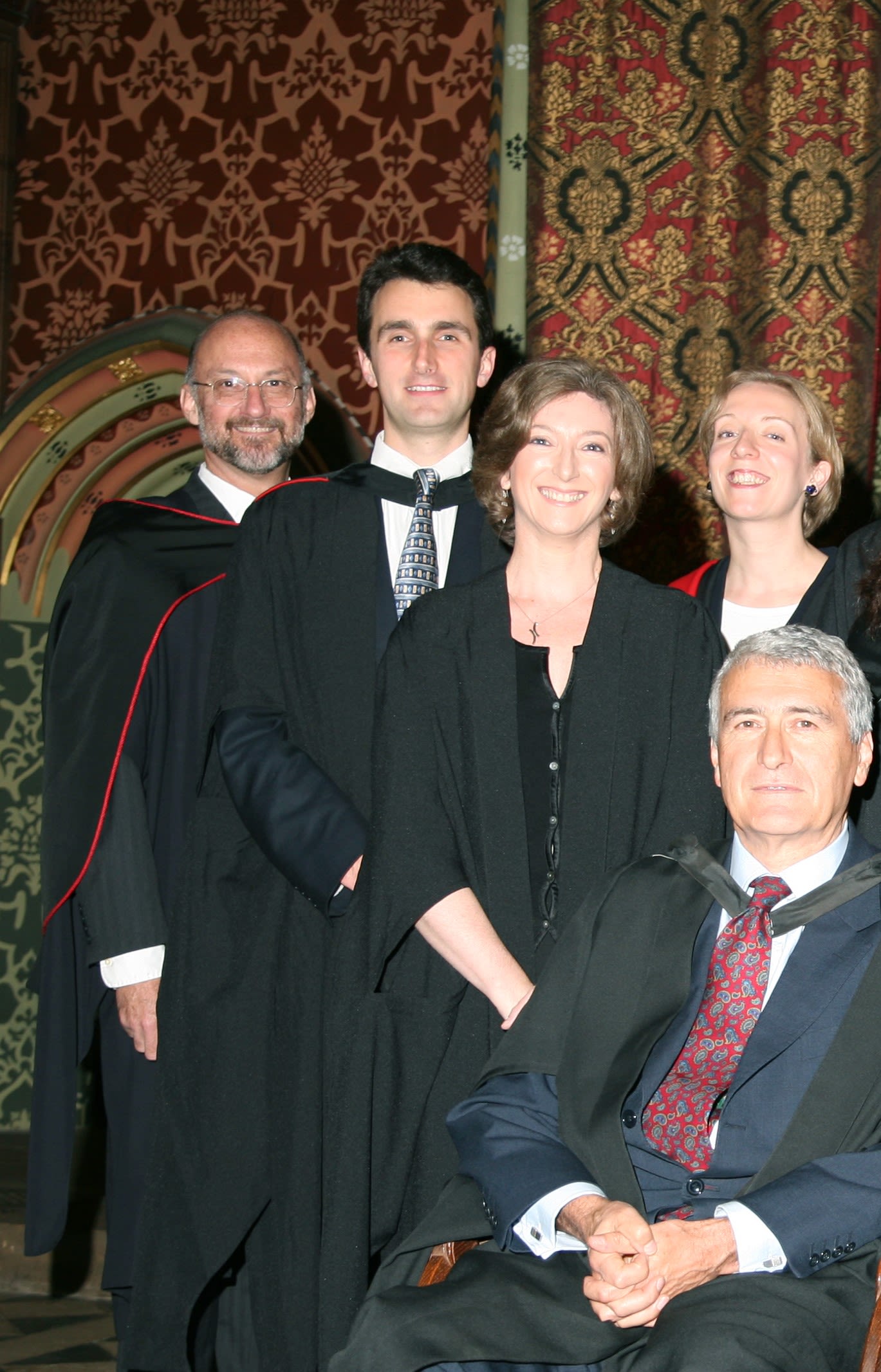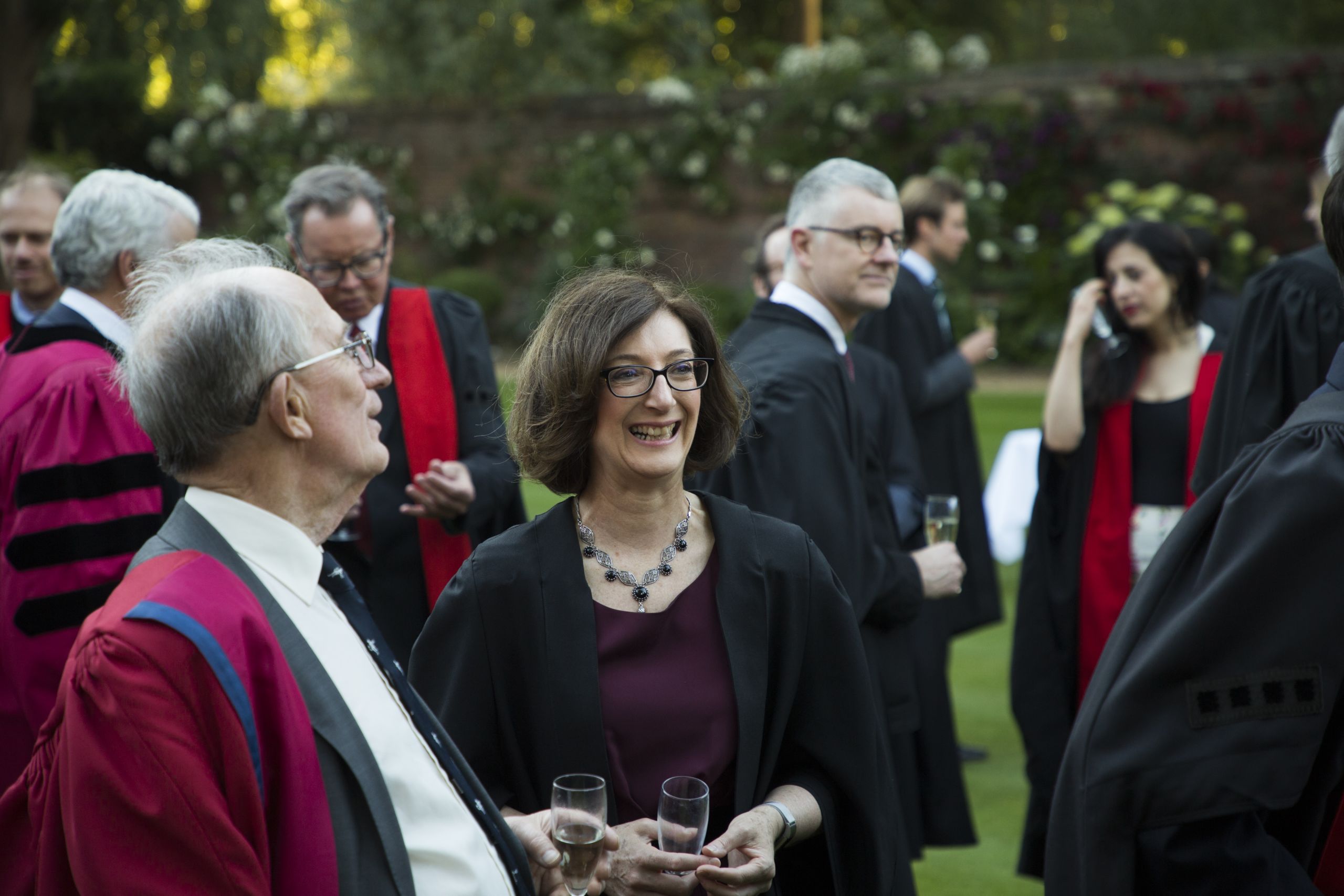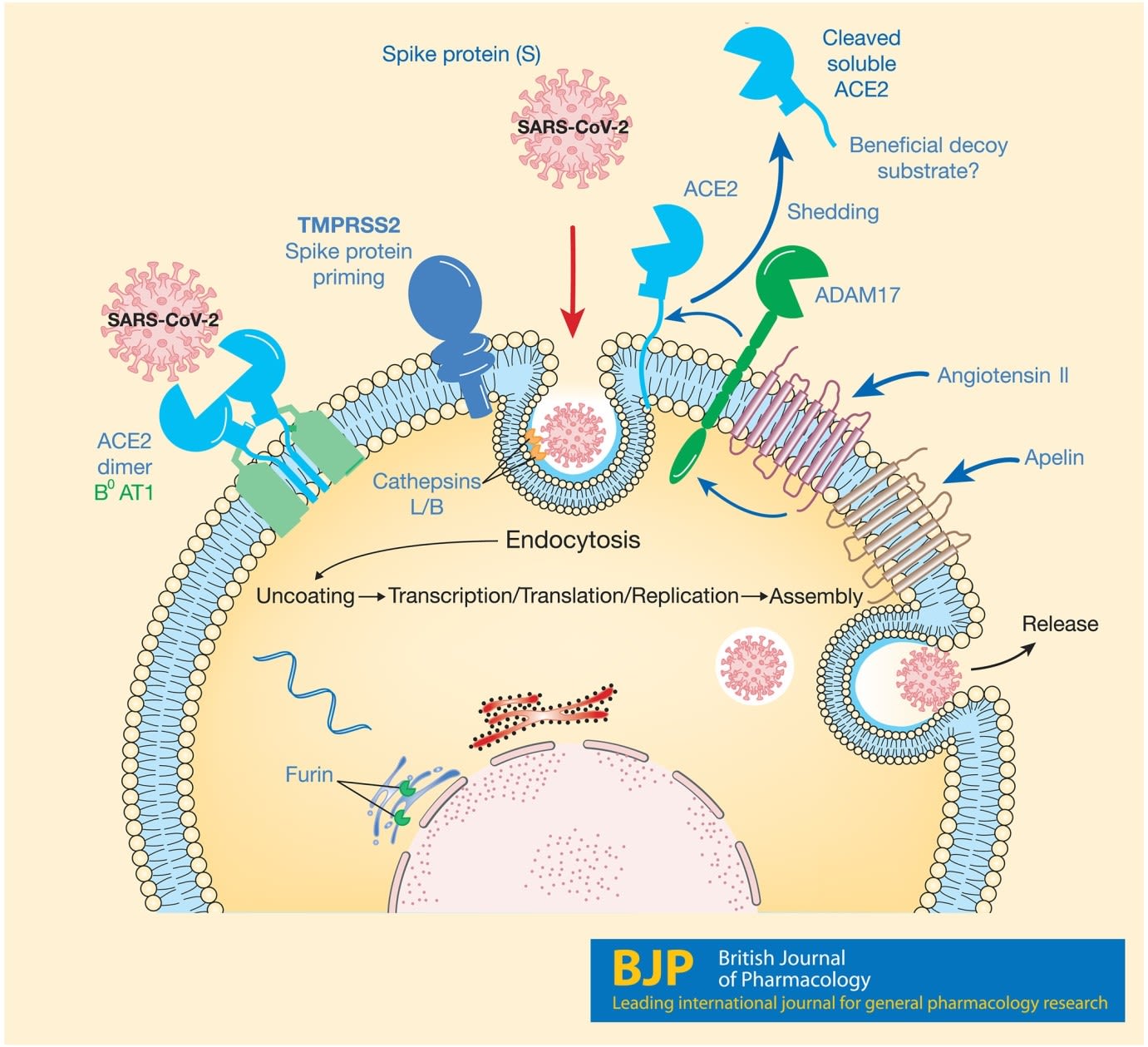Introducing the inaugural John Eatwell Fellow, Dr Janet Maguire


Dr Maguire at her admission as a Fellow of Queens'.
Dr Maguire at her admission as a Fellow of Queens'.

Dr Maguire pictured with Dr Brian Callingham in 2018.
Dr Maguire pictured with Dr Brian Callingham in 2018.
Dr Janet Maguire is Director of Studies in Medicine & Veterinary Medicine and Acting Dean of College.
Background
- BSc, Pharmacology, University of Bristol
- PhD, School of Pharmacy, University of London
- Now Senior Research Associate in the Division of Experimental Medicine and Immunotherapeutics (EMIT) within the Department of Medicine at Addenbrooke’s Hospital
- Elected Fellow of the British Pharmacological Society in 2019
- Named as a Highly Cited Researcher in 2019 and 2020, meaning multiple papers rank in the top 1% of citations, demonstrating significant research influence
What are the challenges facing medical Fellows at the moment?
The medical and veterinary medicine Fellows at Queens’ include frontline clinicians, whose jobs are made more challenging by the current global
pandemic, and active research scientists who manage research groups, prepare research grants and supervise PhD students. In addition we all have Departmental responsibilities such as committee work and examining, alongside our College teaching commitments.
How do we balance these? Honestly, with difficulty; fundamentally, we all share a strong desire to help our students make the most of the diverse academic, research and clinical opportunities available to them
throughout their six years at Queens’ and beyond into their clinical careers.
What difference will The John Eatwell Fellowship make?
The creation of this Fellowship reflects the deep respect and affection in which our former President is held. I am honoured to be the inaugural Fellow and convey my thanks to all the alumni, current members and friends of the College who have made this possible.
The strength of The John Eatwell Fellowship is its adaptability; it can provide support in any subject area, as and when need arises. This has proved invaluable for teaching in the medical and veterinary sciences.
My appointment to this Fellowship has allowed me to take on more responsibility and expand my role to support the teaching team and our current cohort of over seventy students. This has been critical in the
current pandemic.
How important is the supervision system and small-group teaching, especially in the face of Covid-19?
The supervision system is pivotal to teaching in Cambridge; it’s what sets Cambridge apart from most other universities. Supervisions are interactive and designed to help students develop their academic and
transferable skills.
Just as important is that small group teaching allows supervisors the opportunity to get to know our students as individuals. It is a real benefit of the system that each student has a number of different Fellows to whom they can turn for advice or just to be there for a chat.
Dean of College in the 21st century…
Queens’ is a Community. The role of the Dean is to ensure our common values are upheld by all, creating a safe and supportive environment for students, staff and Fellows to flourish, as per the Queens’ motto: Floreat Domus.
Women in Pharmacology: your experience
Current statistics compiled by the British Pharmacological Society, of which I am a Fellow, report that while the genders are equally represented
in the student membership there is then a decline in female membership following graduation such that less than 20% of Fellows (a senior category of membership for those demonstrating distinction in pharmacology) are women. This reflects the situation across many STEM careers.
There are a number of factors that could be influencing this, including lack of job security and unclear career pathways. The transition to research independence is extremely challenging and attrition at this stage appears to disproportionately affect women.
There are moves in the right direction, including grants from some funding bodies available to encourage women back into academia after taking time out to start a family. For my part, I have been fortunate to have very supportive colleagues.
Any advice for young scientists?
Be realistic: this can be a difficult career choice, although it can also be extremely rewarding in so many ways. My advice is to make sure that you will mostly love it and be prepared to work hard, especially when it gets tough. I would also recommend finding a good mentor.
Slugs, dahlias and zoom quizzes…
In my spare time, you will find me in my garden. It’s small, but seems to be able to produce enough weeds to keep me occupied for hours! It’s at its best in early summer when the roses are just wonderful – I only make space for the fragrant varieties. To try to extend the season, this year I planted dahlias for the first time. These have been a real success and I love their striking colours and shapes. I’ll be planting lots more next year; if I can just keep the slugs away…
I also enjoy cooking, yoga and spending time with family and friends, although Covid-19 has meant that for me, like everyone, time with family is now more often via Zoom rather than welcoming them to Cambridge for the weekend.
In focus: exploring the proteins that make medicines work...
Pharmacology studies the interactions between chemicals and biosystems.
These include transmitters and hormones produced by the body, compounds we are exposed to in the environment, substances of abuse and importantly medicines. The rapid identification of existing and
experimental drugs that have improved outcomes for patients with Covid-19 brings pharmacology vividly to life in a very immediate way.
In my research I study a family of receptor proteins that are present on the surface of most cells in the body. These receptors are the means by which external chemical cues can influence the way a cell responds to its environment.
I was fortunate to be invited to help establish a small research team, based at Addenbrooke’s Hospital, with the objective to discover the role of newly identified cardiovascular peptides. These are small proteins that
contribute to the normal function of the heart and blood vessels.
We focus predominantly, but not exclusively, on the human cardiovascular system. Identifying the cell types that synthesise and release these peptides helps us explore their physiological role.
Our group collaborates with chemists in Cambridge and elsewhere who can design molecules to activate or block these receptors. Our aim is to identify new targets for therapies, creating novel treatments for human diseases, especially those for which there are currently few or no effective treatments available.
My research focusses on a subgroup of the G Protein Coupled Receptor (GPCR) superfamily. These Family A GPCRs are the target for about one third of all medicines. By discovering their cellular expression and function, our research group aims to understand their role in health and disease.
With the onset of the pandemic, our team switched focus. Working with collaborators in Europe we looked for evidence to explain why older individuals or those with existing heart disease might be more susceptible to Covid-19.
What we have found is that the amount of key proteins involved in allowing Sars-Cov-2, the virus responsible for Covid-19, to get inside cardiomyocytes (the contractile cells of the heart) is increased with age and disease. We are now working with researchers on the Addenbrooke’s site to create a
model to test compounds that might prevent viral entry in the heart.
Ongoing projects:
1. Approximately one third of patients with angina originating from small coronary artery dysfunction (microvascular angina) do not respond to current treatments. Our research, collaborating with colleagues in Glasgow, recently showed that patients suffering from microvascular angina were more likely to carry a particular gene variant than a healthy population, and that this variant was associated with
higher circulating levels of endothelin-1, a small protein that interacts with its receptors to cause blood vessels to go into spasm and the artery wall to thicken over time.
We demonstrated that in blood vessels obtained from these patients this spasm could be fully reversed by an endothelin antagonist, Zibotentan. Data from this study has been used to successfully obtain funding for a clinical trial, the PRIZE Study, using Zibotentan as a treatment for patients with this type of angina.
2. Glioblastoma multiforme (GBM) is the most lethal primary tumour of the central nervous system, with most patients only surviving about a year, even with current treatments of surgery, radiation and chemotherapy. In a collaboration funded by Cancer Research UK we have shown that the apelin receptor (a GPCR) is highly expressed in human GBM samples but not in the surrounding healthy brain. Apelin promotes the growth of new blood vessels required to support the growing tumour. Our aim is to design and test compounds that block the apelin receptor to obtain proof of principle for a new therapeutic strategy for GBM.

© 2020 The Authors. British Journal of Pharmacology published by John Wiley & Sons Ltd on behalf of British Pharmacological Society
© 2020 The Authors. British Journal of Pharmacology published by John Wiley & Sons Ltd on behalf of British Pharmacological Society
